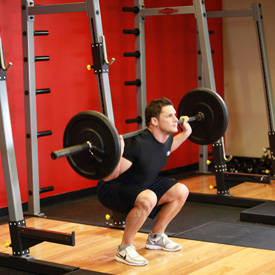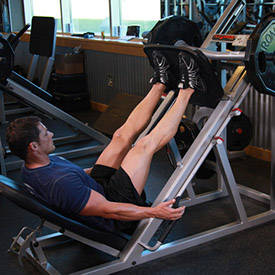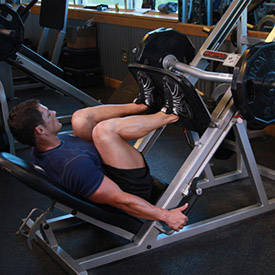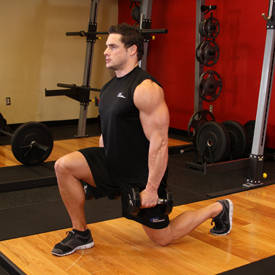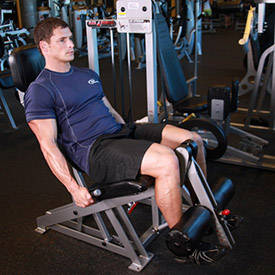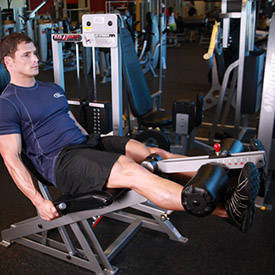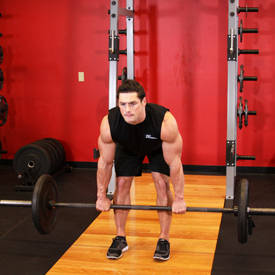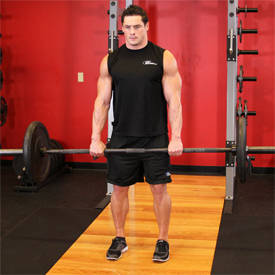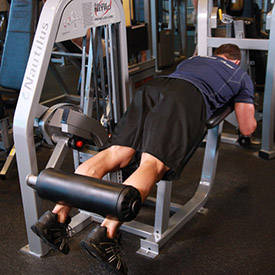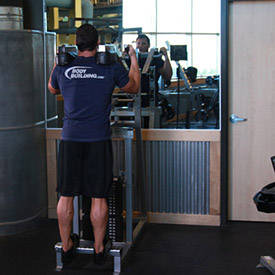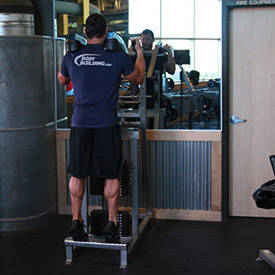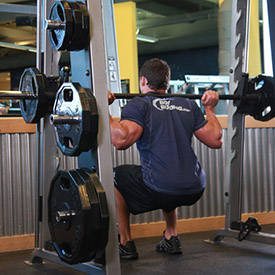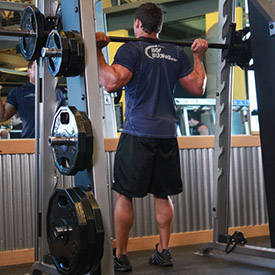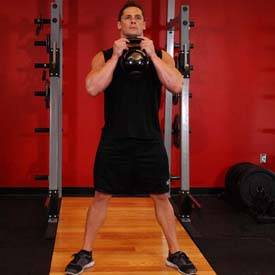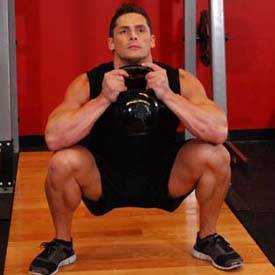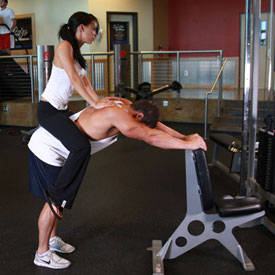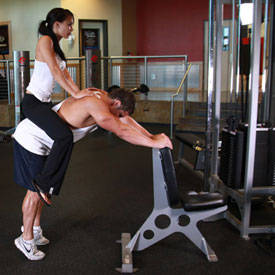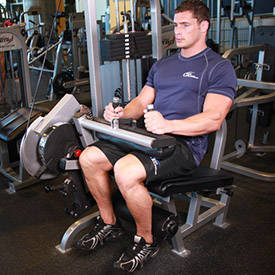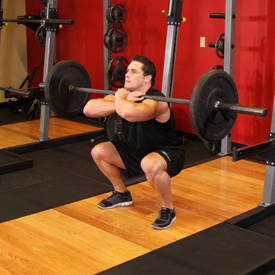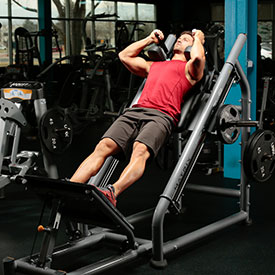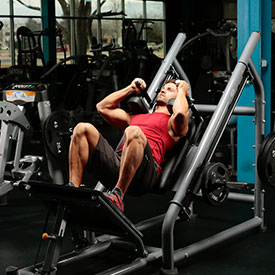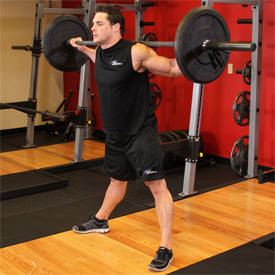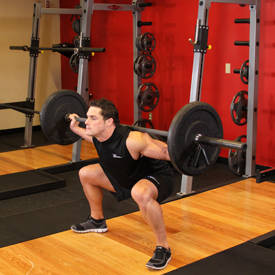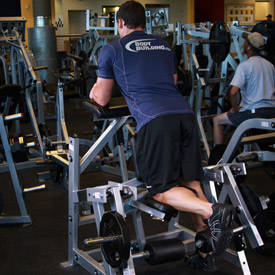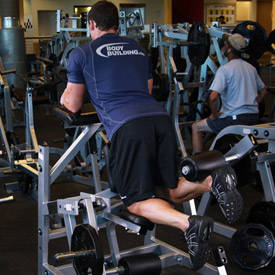The 7 Best Workouts For Thicker Quads, Glutes, And Hams
Leg Workouts For Men: The 7 Best Workouts For Thicker Quads, Glutes, And Hams
Rather than following a one-size-fits-all workout on leg day, let your goals drive your routine.
"Leg day"—the very phrase conjures up images of nausea, days of
hobbling, and legs that feel like jello. The feelings may be universal,
but bodybuilders looking to annihilate legs have countless workout
options at their disposal. While most workouts start with some variation
of the squat—widely acclaimed as the best lower-body movement—exercise
choice, foot position, and advanced training techniques all allow you to
emphasize one particular area of the legs over others. That's great if
you want to thicken up your quads, fill out your glutes, or beef up your
hamstrings because of a weakness—or simply because you want to
prioritize an area for a length of time.
Each of the seven leg workouts below has a different focus. Find one
that suits your needs for the next 4-8 weeks before switching to another
specialized program. Or simply follow a solid overall mass-building
plan like the one listed under Goal 1.
While we can provide any number of formulas for advanced leg growth,
you're still on your own when it comes to generating the intensity to
survive a high-octane workout and withstanding the pain. Nail those last
two factors and you'll leave your wheels no choice but to grow.
Goal 1 More Overall Leg Mass
Mass-building comes with a set of rules. That means starting your
workout with the most challenging exercises and heaviest loads, hitting
the thighs from a variety of angles, keeping the volume (number of total
sets and reps) high, and training to muscle failure.
Altering your foot placement on the leg press allows you to recruit
leg musculature in slightly different ways. Putting your feet up higher
on the sled shifts some of the emphasis from the quads to the hams and
glutes because a greater degree of hip flexion/extension is taking
place. Also, don't shortchange the depth of your knee bend—which should
reach 90 degrees—by going too heavy—that also limits glute and
hamstrings activation. Unless you're following a pre-exhaust routine,
save the single-joint movements for last.

Mass-building comes with a set of rules. That
means starting your workout with the most challenging exercises and
heaviest loads, hitting the thighs from a variety of angles, keeping the
volume (number of total sets and reps) high, and training to muscle
failure.
The workout follows a reverse-pyramid protocol, which allows you to
take more total sets to muscle failure. As the rep target goes up, be
sure to lighten the weight commensurately. The workouts target four
muscle groups: quads, glutes, hamstrings, and calves. To shorten the
workout, you could eliminate exercises for calves, hamstrings, or both;
if so, hit calves and hammies on a different training day.
Notes
- Do as many warm-up reps as you need, but never take them to muscle failure.
- Choose a weight that allows you to reach muscle failure by the target rep listed.
- If you have a spotter, do a few forced reps on your 1-2 heaviest sets of each exercise.
Mass-Building Routine 
1
Barbell Squat
4 sets of 6-8, 6-8, 8-10, 8-10 reps
Lighten the weight after your first 2 sets.
2
Leg press
4 sets of 8-10, 8-10, 10-12, 10-12 reps
Alternate 2 different foot positions.
3
Walking dumbbell lunge
3 sets of 10, 12, 14 steps per side
4
Leg Extension
3 sets of 10 reps
Do a single dropset on each set.
5
Romanian Deadlift
3 sets of 8, 10, 12 reps
6
Lying Leg Curl
3 sets of 8, 10, 12 reps
7
Standing Calf Raise
4 sets of 12, 12, 20, 20 repsGoal 2 Greater Leg Definition
Simply doing more work with light weight for high reps isn't enough
to get you lean. To keep your metabolism high, you still need that
stimulus for building and keeping muscle size. That will help boost
excess post-exercise oxygen consumption (EPOC), which roughly translates
to the number of calories you burn after your workout is over.

Simply doing more work with light weight for
high reps isn't enough to get you lean. To keep your metabolism high,
you still need that stimulus for building and keeping muscle size.
That's why the first exercise here is done straight-sets-style, but
the rest of the workout consists of supersets with multijoint exercises,
along with reduced rest periods and a high volume of work.
Notes
- Do as many warm-ups as you need, but never take them to muscle failure.
- Choose a weight that allows you to reach muscle failure by the target rep listed.
- The first exercise is done with heavier weights, which is key for maintaining muscle tissue and keeping your metabolism high during periods of dieting.
- Strive to keep your rest periods short and your heart rate up, making this as much a cardio activity as a muscle-building one.
Get-Ripped Routine 
1
Smith Machine Squat
4 sets of 8-10 reps
2 sets with your feet underneath and 2 sets with your feet out front.
Superset
2
Leg Press
3 sets of 10-12 reps, no restGoblet Squat
3 sets of 10-12 reps, rest only as neededSuperset
3
Smith-machine reverse lunge
3 sets of 10-12 reps per leg, no restLeg Extension
3 sets of 12-15 reps, rest only as neededSuperset
4
Lying Leg Curl
4 sets of 10-12 reps, no restDonkey Calf Raise
4 sets of 12-15 reps, rest only as neededGoal 3 Starting Strong
Learning to squat can be a challenge, which is why the simple goblet
version is a great place to start. The idea here is to learn and
practice movement patterns before loading them with heavier weights or
graduating to more complex moves.

The idea here is to learn and practice
movement patterns before loading them with heavier weights or graduating
to more complex moves.
This workout is largely machine based, which allows for a more
controlled introduction to weight training. As your coordination
improves and your muscles strengthen, move on to more challenging
free-weight moves and heavier loads.
Notes
- Do as many warm-ups as you need, but never take them to muscle failure.
- Choose a weight that allows you to approach muscle failure by the target rep listed, but stop a rep or two short. Proper technique starts to give way when you push to muscle failure, and your priority here is learning good form.
- Start the workout with more challenging multijoint movements. Because they recruit a larger amount of muscle mass, rest periods are correspondingly longer.
Beginner's Routine 
1
Goblet Squat
4 sets of 10-12 reps, 90 sec. rest
2
Leg Press
3 sets of 10-12 reps, 90 sec. rest
3
Leg Extension
3 sets of 10-12 reps, 60 sec. rest
4
Seated Leg Curl
3 sets of 10-12 reps, 60 sec. rest
5
Standing Calf Raise
3 sets of 15 reps, 60 sec. restGoal 4 Emphasize Your Quads
Because multijoint leg movements work your legs from top to bottom,
it's impossible to completely isolate one area over another. However,
you can emphasize one area over another. In this case, we're
trying to maximize the range of motion of the knee joint while limiting
the range of motion at the hip joint. One way to do this is by changing
up your foot position on machine exercises.
The front squat also emphasizes the quads more than, say, a barbell
back squat does by shifting your center of gravity forward. With heavy
partials, you're not going deep, so you can really overload the quads;
put on up to 30 percent more weight than you normally use, but go only
part of the way down.
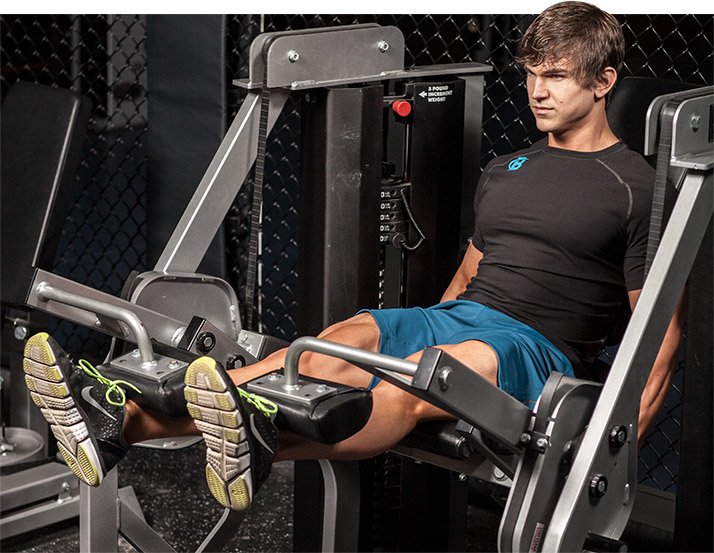
Because multijoint leg movements work your
legs from top to bottom, it's impossible to completely isolate one area
over another. However, you can emphasize one area over another.
This workout follows a reverse-pyramid protocol, which allows you to
take more total sets to muscle failure. As the rep target goes up, be
sure to lighten the weight commensurately. Note that this workout covers
only quads and glutes; add hamstring and calf exercises as desired.
Notes
- Do as many warm-ups as you need, but never take them to muscle failure.
- Choose a weight that allows you to reach muscle failure by the target rep listed.
- This scheme follows a reverse pyramid, meaning you lighten the weight after your first 1-2 sets for slightly higher reps.
- If you have a spotter, do a few forced reps on your 1-2 heaviest sets of each exercise.
Quad-Emphasis Routine 
1
Front Squat
4 sets of 6-8, 6-8, 8-10, 12 reps
Lighten the weight after your first 2 sets.
2
Hack Squat
3 sets of 8, 10, 12 reps
Keep feet low and hip-width apart on the platform.
3
Hack Squat
3 sets of 6 heavy partial reps
Descend only about halfway down.
4
Leg Press
3 sets of 8, 10, 12 reps
Keep feet low on the platform.
5
Leg Extension
3 sets of 10, 10, 12 reps, last 2 sets are dropsetsGoal 5 Emphasize Your Glutes
While you tried to minimize hip flexion/extension in the quad-focused
workout, here you want to maximize it. Do that by choosing exercises
and foot positions that allow the glutes to be trained through their
full range of motion. Be sure to descend fairly deep in all squatting
motions; otherwise, you'll limit glute activation.
The workout again follows a reverse-pyramid protocol, which allows
you to take more total sets to muscle failure. As the rep target goes
up, be sure to lighten the weight commensurately. The last exercise, the
Romanian deadlift, is considered a hamstring exercise, but it focuses
on the upper region as well as the glutes, especially the glute-ham
tie-in.

While you tried to minimize hip
flexion/extension in the quad-focused workout, here you want to maximize
it. Do that by choosing exercises and foot positions that allow the
glutes to be trained through their full range of motion.
Add knee-joint hamstring and calf exercises as desired for a complete leg workout.
Notes
- Do as many warm-ups as you need, but never take them to muscle failure.
- Choose a weight that allows you to reach muscle failure by the target rep listed.
- This scheme follows a reverse pyramid, meaning you lighten the weight after your first 1-2 sets for slightly higher reps.
- If you have a spotter, do a few forced reps on your 1-2 heaviest sets of each exercise.
Glute-Emphasis Routine 
1
Sumo squat (wide stance)
4 sets of 6-8, 6-8, 8-10, 12 reps
Lighten the weight after your first 2 sets.
2
Leg Press
3 sets of 8, 10, 12 reps
Keep feet high on the platform.
3
Smith-machine reverse lunge
3 sets of 10-12 reps per leg, no rest
4
Butt-blaster machine
3 sets of 8, 10, 12 reps
5
Romanian Deadlift
4 sets of 8, 8, 12, 12 repsGoal 6 Emphasize Your Hamstrings
Hams shouldn't be an afterthought, and not just for aesthetic
reasons; they also support knee-joint integrity. Most bodybuilders are
familiar with the family of leg-curl movements, which can be done lying,
seated, standing, or with one knee supported on a bench. Don't forget
to work the hams from the hip joint as well, which means doing
Romanians.
Often confused with the stiff-legged deadlift (a lower-back exercise)
and even the conventional deadlift (with Romanians, the plates never
touch the floor), it's an effective move for the upper hams where they
tie in with the glutes. Good form is critical with RDLs—keep your back
flat and never try to achieve excessive range of motion if it causes
your back to round.

Good form is critical with RDLs—keep your
back flat and never try to achieve excessive range of motion if it
causes your back to round.
Don't forget, your hams also get worked when you squat deep and when
you control the speed of the descent in squatting motions. However, that
amount of work isn't enough to let you skip dedicated hamstring
exercises. If you decide to split your quad and ham workouts into two
different days, separate them by at least 48 hours to ensure full
recovery. Or tack this workout onto the end of a quad/glute workout,
occasionally even doing it prior.
This workout again follows a reverse-pyramid protocol, which allows
you to take more total sets to muscle failure. As the rep target goes
up, be sure to lighten the weight commensurately.
Notes
- Do as many warm-ups as you need, but never take them to muscle failure.
- Choose a weight that allows you to reach muscle failure by the target rep listed.
- This scheme follows a reverse pyramid, meaning you lighten the weight after your first 1-2 sets for slightly higher reps.
- If you have trouble doing the floor glute-ham raise at the end of your workout, do it earlier when you're less fatigued.
- Alternate seated and lying leg curls for the standing single-leg curls so you're including all three at least once every three workouts.
Hamstring-Emphasis Routine 
1
Smith-machine Romanian Deadlift (shown with barbell)
4 sets of 6-8, 6-8, 8-10, 12 reps
Lighten the weight after your first 2 sets.
2
Standing single-leg curl
3 sets of 8, 10, 12 reps
3
Floor Glute-Ham Raise
3 bodyweight sets to failureGoal 7 Pre-exhaust Your Legs
This workout starts by targeting just your quads with a single-joint
movement. By the time you get to the multijoint exercises that follow,
your quads will already be highly fatigued—but your glutes and hams will
have been spared. Neither muscle group will be the weak link in those
follow-up exercises; you'll be pushing your quads, however, to their
limit.

With the quads prefatigued, everything that follows will feel harder, so lighten the weights up here, too.
This more advanced method of training is a great way to rise above a
plateau. Even though you'll be significantly stronger on your leg
extensions—which you normally do toward the end of your workout—keep the
reps relatively high to avoid overtaxing the knee joint. With the quads
prefatigued, everything that follows will feel harder, so lighten the
weights up here, too.
Notes
- Do as many warm-ups as you need, but never take them to muscle failure.
- Choose a weight that allows you to reach muscle failure by the target rep listed.
- By flip-flopping the exercises, you'll be a little stronger on your single-joint moves but weaker on multijoint ones, so adjust your weights accordingly.
Pre-exhaust Routine 
1
Leg Extension
5 sets of 8-10 reps
2
Smith-Machine Squat
4 sets of 8-10, 8-10, 10-12, 12 reps
Lighten the weight after your first two sets.
3
Hack Squat
3 sets of 10 reps
4


